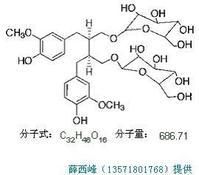物品介紹
亞麻木酚素叫開環異落葉松酚二葡萄糖苷。這是與人體雌激素十分相似的植物雌激素。亞麻木酚素主要存在於亞麻籽中,其含量取決於亞麻品種、氣候和生態條件,一般約占籽重量的0.9%~1.5%,比其它已知含木酚素的66種食品高100~800倍.
來源
為亞麻科植物亞麻Linum usitatissimum L.的種子。
功能作用
亞麻木酚素對雌激素依賴性疾病乳腺癌、前列腺癌、經期綜合徵、骨質疏鬆有預防作用。除此之外,臨床研究顯示亞麻木酚素對糖尿病、胃腸腫瘤、冠心病、腎臟病,抗氧化性都有有益的作用。
套用狀況
近年來,以加拿大、澳大利亞、英國和美國為主的西方已開發國家,對亞麻籽作為功能食品的研究和開發作了大量的工作,以亞麻籽粉為代表的產品早已面市多年,成為中、老年人的常備保健品。最近,符合療效性要求的高純度、標準化木酚素提取物的產品也上市,可以廣泛套用於膠囊、壓片、穀物早餐和快餐食品的添加劑。還有含有ω-3脂肪酸、可溶性食物纖維和木酚素的營養功能性超濃乳狀液和全乳飲料等多種產品不斷出現在市場上。我國近幾年一些工廠也開始研究亞麻木酚素的提取工作,現在市場上有西安天一生物技術有限公司生產的20%、40%、60%的亞麻木酚素。補充了我國在這方面的空白。聯繫人:薛西峰
Lignans are naturally occurring chemicals widespread within the plant and animal kingdoms. Several lignans—with intimidating names such as secoisolariciresinol—are considered to be phytoestrogens, plant chemicals that mimic the hormone estrogen. These are especially abundant in flaxseeds and sesame seeds. Bacteria in our intestines convert the naturally occurring phytoestrogens from flaxseed into two other lignans, enterolactone and enterodiol, which also have estrogen-like effects. In this article, the term lignans refers to these two specific lignans as well as the phytoestrogen kind, but not to the wide variety of other lignans.
Lignans are being studied for possible use in cancer prevention, particularly breast cancer. Like other phytoestrogens (such as soy isoflavones), they hook onto the same spots on cells where estrogen attaches. If there is little estrogen in the body (after menopause, for example), lignans may act like weak estrogen; but when natural estrogen is abundant in the body, lignans may instead reduce estrogen's effects by displacing it from cells. This displacement of the hormone may help prevent those cancers, such as breast cancer, that depend on estrogen to start and develop. In addition, at least one test tube study suggests that lignans may help prevent cancer in ways that are unrelated to estrogen.1
--------------------------------------------------------------------------------
Requirements/Sources
The richest source of lignans is flaxseed (sometimes called linseed), containing more than 100 times the amount found in other foods! 11 Flaxseed oil, however, does not contain appreciable amounts of lignans.12 Sesame seed is an equally rich source.44 Other food sources are pumpkin seeds, whole grains, cranberries, and black or green tea.13
--------------------------------------------------------------------------------
Therapeutic Dosages
Effective dosages of purified lignans have not been determined. In studies of flaxseed as a source of lignans, flaxseed has been taken at a dose of 5 to 38 g daily.
Cooking flaxseed apparently does not decrease the amount of lignans absorbed by the body.
--------------------------------------------------------------------------------
Therapeutic Uses
A number of preliminary human and animal studies suggest that lignans may be helpful for cancer prevention , particularly of breast and colon cancer, as well reduction of cholesterol. Other highly preliminary research suggests that flaxseeds or lignans may decrease menopausal symptoms 16 and improve kidney function in various types of kidney disease (specifically, lupus nephritis and polycystic kidney disease).17,18
Warning: Flaxseed or other treatments for kidney disease should be taken only under a doctor's supervision, due to the serious nature of these disorders.
Despite positive preliminary results in animal studies,14,15 studies in humans have yielded mixed results for improving cholesterol levels.45,46
--------------------------------------------------------------------------------
What Is the Scientific Evidence for Lignans?
The most promising use for lignans is in cancer prevention. According to observational studies, people who eat more lignan-containing foods have a lower incidence of breast and perhaps colon cancer.19 This, however, does not prove that lignans are the cause of the benefit, for other factors in these foods, or in the characteristics of the people who consume these foods, may have been responsible. Double-blind, placebo-controlled studies are necessary to prove that a medical treatment provides benefits, and none have yet been reported for lignans. (For information on why this type of study is so important, see Why Does This Database Rely on Double-blind Studies?)
Nonetheless, animal studies offer additional support for a potential cancer-preventive or even cancer-treatment effect. Several studies showed that lignan-rich foods or lignans found in flax inhibited breast and colon cancer in animals 20,21,22 and reduced metastases from melanoma (a type of skin cancer) in mice.23 Test tube studies have found that flaxseed or one of its lignans inhibited the growth of human breast cancer cells 24 and that the lignans enterolactone and enterodiol inhibited the growth of human colon tumor cells.25
In many of these studies, it isn't clear whether lignans are responsible for the benefit seen, as flaxseeds contain many other substances. Animal and human studies have begun to examine specific lignans, and results seem to confirm that at least some of the positive effects probably come from the lignans themselves;26,27,28 still, until more and better designed trials are done, we will not know lignans' precise effects on the human body, or the precise dose needed to prevent cancer.
--------------------------------------------------------------------------------
Safety Issues
Women who are pregnant or breastfeeding should avoid high intake of flaxseed or purified lignans. One study found that pregnant rats who ate large amounts of flaxseed (5% or 10% of their diet), or a purified lignan present in flaxseed, gave birth to offspring with altered reproductive organs and functions, and that lignans were also transferred to the baby rats during nursing.36 In humans, eating 25 g of flaxseed per day amounts to about 5% of the diet.37
High intake of lignans may not be safe for women with a history of estrogen-sensitive cancer, such as breast cancer or uterine cancer. A few test tube studies suggest that certain cancer cells can be stimulated by lignans such as those present in flaxseed.38 Other studies found that lignans inhibit cancer cell growth.39 As with estrogen, lignans' positive or negative effects on cancer cells may depend on dose, type of cancer cell, and levels of hormones in the body. If you have a history of cancer, particularly breast cancer, talk with your doctor before consuming large amounts of flaxseeds.
Other potential concerns are discussed in the safety section of the Flaxseed article.

